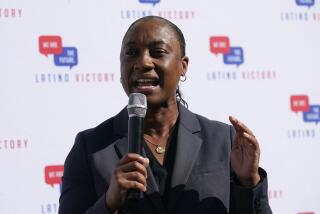Indecision, Not Prop. 208, Holding Feinstein Back
- Share via
SACRAMENTO — A federal judge has removed U.S. Sen. Dianne Feinstein’s last credible rationale for delaying a decision about whether to run for governor. Now, she’s expected to decide within a few days, possibly this week.
U.S. District Judge Lawrence Karlton’s ruling last Tuesday that quashed the latest attempt by California voters to reform campaign financing--Proposition 208--was great news for most state politicians, and has jarred them into renewed, aggressive fund-raising.
For Feinstein, it has lit another kind of fire. She really has not decided whether to run, close aides report. After the ruling, she realized there’s no good reason for further delay--no more mystery about 1998 campaign rules.
The demise of 208 means it’s suddenly less difficult for both Feinstein and Lt. Gov. Gray Davis to compete financially against super-rich Al Checchi, who intends to spend up to $50 million of his own fortune in the Democratic primary. Feinstein and Davis no longer are limited to $1,000 individual contributions.
In truth, however, uncertainty over 208’s contribution limit probably provided Feinstein with more of a rationale for procrastination than it did a real cause for fund-raising anxiety. “She has never expressed a concern about her ability to raise money,” says one advisor. “She has a big donor list.”
But another advisor has a different take: “Everybody and their mother have been calling her to run. Now they can help out [with big bucks].”
The main question in Feinstein’s mind always has been whether she’s willing to endure her fourth bruising battle in five elections. She’s 64, enjoys the Senate and is not up for reelection until 2000. Does she keep doing the work she’s proud of or dive into a muddy gubernatorial race? She’d be the front-runner and long has wanted to be governor, but who needs the campaign head chops?
Either way, Feinstein believes, she can push her new education reform initiative.
“She’s really been thinking about this long and hard,” says consultant Bill Carrick, Feinstein’s chief strategist. “My gut tells me at the end of the day she probably runs.”
Others around her are less certain--and much less certain than they were last fall.
The candidacy filing deadline is not until March 6. But Feinstein knows time’s wasting.
*
In the state Capitol, meanwhile, the politicians have reacted to Judge Karlton’s decision like hungry dogs suddenly freed from their cages. Legislators had been restrained by a $500 contribution limit.
Within minutes of the ruling, some lawmakers were dialing lobbyists for dollars and booking fund-raising events. Restaurateurs and caterers were celebrating. One political consultant was overheard singing, “We’re in the money.”
“All the lobbyists have their cell phones off,” one lobbyist told me.
But another reported getting “20 to 30” money-grubbing pleas within 48 hours of the ruling, including calls from the top legislative leaders. “They’re faxing out the invitations because the mail’s too slow,” he said.
The lawmakers’ basic pitch to the special interests: There’s now “a window of opportunity” to give money before another judge sets aside Karlton’s ruling. Nobody really expects that to happen, but it’s an excuse for a quick fund-raiser.
“I’ve been saying there’s no money tree in that window,” a lobbyist related. “We didn’t budget for this, we budgeted for 208. . . . Sure we can come up with some money. But not that fast, not within 24 hours.”
*
In his decision, the judge wrote that recent history--some bribery convictions--”indicates that the problem of corruption in the legislative process is not illusory.” But he didn’t say what to do about it. He only said that 208 is the wrong fix-- unconstitutional because it doesn’t generate enough money for a candidate “to deliver [a] message [and] mount an effective campaign.”
So what to do?
Tony Quinn, a Republican analyst and former member of the state Fair Political Practices Commission, contends it is impossible to limit money in politics. “Government is in so many facets of our lives that people always will spend to protect their interests,” he says. If they’re blocked from giving directly to candidates, they’ll find loopholes--”soft money” or “independent” committees.
The answer, he and others argue, is to make campaigns less expensive: free TV ads, cheaper postage, shorter campaigns. Also, rapid disclosure of contributions so voters can know which special interests are buying which candidates.
All good ideas. But we voters also should be buying state candidates ourselves, with some public financing. Too often, we’re getting what we pay for.
More to Read
Get the L.A. Times Politics newsletter
Deeply reported insights into legislation, politics and policy from Sacramento, Washington and beyond. In your inbox twice per week.
You may occasionally receive promotional content from the Los Angeles Times.











